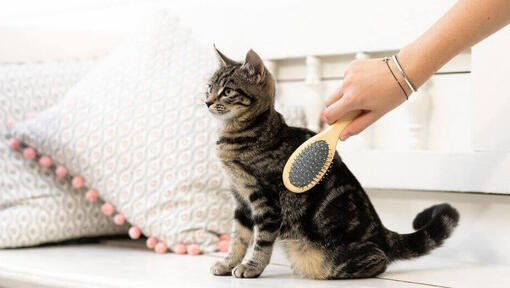The cat's gut: These tips will keep your cat healthy
The immune cells of the intestine produce antibodies to recognize attacks from the outside. 80% of all immune cells are located in the intestine, which shows how important a healthy intestine is for a cat's well-being. The antibodies can bind and neutralize pathogens so that they no longer pose a threat.
A healthy and balanced intestinal microflora also makes an important contribution in the fight against potentially pathogenic bacteria and the resulting cat diseases. These so-called "bad" bacteria compete with the "good" bacteria in the cat's intestine. It is more difficult for the "bad" bacteria to spread in a balanced and healthy intestinal flora.
How do I know if my cat has a healthy gut?
A disease of the digestive tract can manifest itself through various symptoms, including diarrhea, constipation, vomiting, loss of appetite, apathy or lethargy. This is often caused by inflammation in the digestive organs stomach, small intestine or large intestine. Inflammation is often triggered by germs. But there are also other causes: stress, parasites, changes in food or hairballs. If your cat is suffering from indigestion, you should visit your veterinarian to determine the cause and take appropriate action. In the case of severe or prolonged diarrhoea and vomiting, your cat can dehydrate very quickly due to the high loss of fluids. This can quickly become dangerous, especially with small kittens, but you should also go to the vet after 24 hours at the latest with adult animals.
The following factors can be causes of intestinal problems in cats:
- Parasites such as worms or giardia that affect the gastrointestinal tract
- Infections (by viruses or bacteria)
- Food leftovers from humans
- Other diseases (e.g. of the kidneys)
- Swallowed foreign bodies
- Poisonous plants and other poisons (e.g. pesticides, cleaning agents)
- Stress and psychological strain
- Food intolerances or allergies
- Too fast feed change
- Spoiled food
Five tips for a healthy cat gut
The health of the cat's intestine is therefore the be-all and end-all. But how do you manage to maintain them? Below you will find five simple and effective tips on how to optimally support your cat's digestion and avoid intestinal diseases in cats:
1. A balanced diet
An appropriate and balanced cat diet is a good way to keep the cat's intestines healthy and resistant to pathogens. Therefore, a species-appropriate diet is very important: You should choose a food that supports your cat's natural defenses. Valuable ingredients can boost the cat's immune system: The intake of heat-treated lactic acid bacteria, which are included in the entire PURINA ONE dry food range, has been shown to help promote the formation of antibodies in the cat's intestines, while omega-6 fatty acids and other selected nutrients ensure that your cat has healthy skin and a shiny coat.
On the other hand, an unbalanced diet can affect health. Avoid any foods that are toxic to cats (e.g., garlic, chocolate, or avocado), foods that can cause bloating (e.g., cabbage), or foods that can lead to weight gain (e.g., human food or inadequate daily rations).
If your cat is already overweight, you should work with your veterinarian to draw up an appropriate diet plan and make sure you get more exercise.
2. Be careful
Some cats are particularly sensitive to food changes and food changes. If you change your cat's food, it is recommended to do it step by step. A change over several days gives the cat's intestines time to get used to the new food. As a rule, you should take seven to ten days to do this.
3. Water
If your cat doesn't drink, the lack of adequate water intake can lead to health risks. It also endangers the health of the urinary tract. In addition, water intake counteracts constipation, because a certain water content is necessary to transport the intestinal contents quickly.
To encourage your cat to drink, place several water bowls in different places in your home. Remember to place the water bowl far enough away from the litter box. The water should be fresh and changed at least twice a day. Some cats prefer running water. If this is the case with your cat, you can use a water fountain, for example.
An easy way to keep your cat hydrated is to add their wet food to their dry food. Wet food has a high water content - so when the cat satisfies its hunger, it involuntarily consumes fluids. However, wet food alone does not replace drinking.
And don't forget... You should always keep an eye on your cat's feces, fur, and behavior. Cats do not show pain or discomfort like humans, they prefer to withdraw or hide. Pay attention to possible changes in their daily routine and don't hesitate to visit the vet whenever you are in doubt about your cat's well-being.
4. Brush your cat (always in the direction of hair growth)

Our cats love to be pampered! Make the most of it and brush them regularly. Not only will you make them purr, but you'll also remove loose hair from their fur.
If your cat swallows these in large quantities, it can lead to hairball formation in the stomach or indigestion and endanger the health of the cat's intestines.
You can read everything about proper cat care, especially during shedding, here: Shedding in cats.
5. On your marks... Ready? Play!
Playing together has many advantages: It stimulates the cat's intestines, which is important for regular bowel movements and healthy digestion. It also helps keep your cat's weight and stress levels under control. 20 minutes a day – split into two different sessions – play will increase energy levels and bond between you and your cat.

Posting Komentar untuk "The cat's gut: These tips will keep your cat healthy"